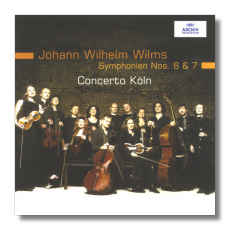
The Internet's Premier Classical Music Source
Related Links
- Wilms Reviews
- Latest Reviews
- More Reviews
-
By Composer
-
Collections
DVD & Blu-ray
Books
Concert Reviews
Articles/Interviews
Software
Audio
Search Amazon
Recommended Links
Site News
 CD Review
CD Review
Johann Wilhelm Wilms

Symphonies
- Symphony #6 in D minor, Op. 58
- Symphony #7 in C minor
Concerto Köln/Werner Erhardt
Deutsche Grammophon Archiv 474508-2 DDD 60:55
Nearly a contemporary of Beethoven, Johann Wilhelm Wilms was born in 1772, and lived until 1847 – two years before Chopin's death. This makes Wilms (much like Beethoven, to a certain extent) a composer who had one foot in the Classical era and another in the Romantic era. With Beethoven, one can hear the progression between those two eras throughout the course of his nine symphonies. Apparently the same is true with Wilms, who wrote seven symphonies, but one has to take that assertion on faith, as Wilms' music remains almost completely unknown. This is the première recording of his last two symphonies. One hopes that this will not be the last we hear of Wilms.
This Dutch composer seems to have spent most of his career in Amsterdam, where he quickly attained local popularity as a pianist, flutist, and music teacher. This left Wilms with little time for composing, but four symphonies date from the last decade of the 18th century. The Fifth Symphony followed in 1806. The Sixth was composed in 1819, and the Seventh came more than a decade later. By then, Wilms was somewhat embittered by the public's failure to appreciate his work as a composer, and was affected not just by his musical milieu but also by the political turmoil that Europe was experiencing during this period. Indeed, the Seventh Symphony has more than a hint of Beethoven's "Eroica" Symphony to it. Too conservative to be mistaken for the work of Beethoven, however, the Sixth and Seventh symphonies also are neither as clever as Haydn nor as luminous as Mozart. That's OK, though, because it would be a boring night sky if all the stars were of the same magnitude, and every constellation needs fainter stars to set off the bright ones; even a faint star can give off distinctive light and heat. Wilms is well worth getting to know.
Concerto Köln had a big success recently with Dream of the Orient, a collection of music from and inspired by the Near East. Once again, they score points by staying off of the beaten path. This is an original instruments ensemble; the strings are 8:7:5:4:3, and there is a small complement of winds and brass. The timbres are piquant without being brash, and stylistically, these performances are lively and aware. Give this a whirl.
Copyright © 2005, Raymond Tuttle



















